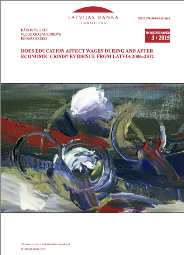Working Paper: Does education affect wages during and after economic crisis? Evidence from Latvia (2006–2012)
Summary
 We employ EU-SILC micro data for Latvia to study how returns to education have changed during the economic crisis of 2008–2009 and afterwards. We found that returns to education increased significantly during the crisis and decreased slightly during the subsequent economic recovery. The counter-cyclical effect of education on wages was particularly strong for males; it was evident in majority of sectors and all age groups (except youth, for citizens of Latvia, resident non-citizens and other country citizens as well as in all regions of the country, particularly outside the capital city region. The share of career component (better access to higher paid occupations, sectors and positions) in the Mincer coefficient remained broadly constant over time. After the crisis, education became even more associated with a longer working week and higher chances to be employed. Furthermore, we show that returns to education in Latvia are generally higher in the capital city and its suburbs than outside the capital city region, for citizens of Latvia than for resident non-citizens and citizens of other countries, but lower for males and young people. Wage differential models reveal a relatively large wage premium for higher education and rather small for secondary education. In line with the previous findings for other countries, the estimates obtained with instrumental variable models significantly exceed the Mincer coefficient.
We employ EU-SILC micro data for Latvia to study how returns to education have changed during the economic crisis of 2008–2009 and afterwards. We found that returns to education increased significantly during the crisis and decreased slightly during the subsequent economic recovery. The counter-cyclical effect of education on wages was particularly strong for males; it was evident in majority of sectors and all age groups (except youth, for citizens of Latvia, resident non-citizens and other country citizens as well as in all regions of the country, particularly outside the capital city region. The share of career component (better access to higher paid occupations, sectors and positions) in the Mincer coefficient remained broadly constant over time. After the crisis, education became even more associated with a longer working week and higher chances to be employed. Furthermore, we show that returns to education in Latvia are generally higher in the capital city and its suburbs than outside the capital city region, for citizens of Latvia than for resident non-citizens and citizens of other countries, but lower for males and young people. Wage differential models reveal a relatively large wage premium for higher education and rather small for secondary education. In line with the previous findings for other countries, the estimates obtained with instrumental variable models significantly exceed the Mincer coefficient.
Key words: returns to education, Mincer coefficient, wage differentials model, higher education wage premium, instrumental variables
JEL codes: I26, J31
Textual error
«… …»

